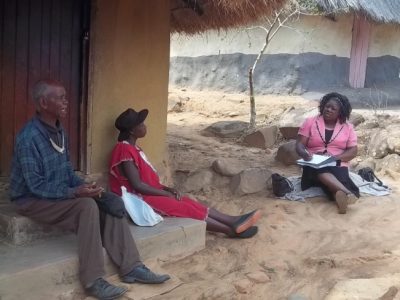A total of 215 VHWs in Chimanimani and Mutare districts were trained in malaria community case management, with support from USAID/MCHIP.

Village health worker, Rebecca Mahwerera (center), sits with a client’s husband and the MCHIP Community Officer. Source: MCHIP
When another community health worker in the area, Rena Dhakama, developed a fever, word was sent to Ms. Mahwerera and the village head. Ms. Dhakama’s husband initially thought it was the flu, however, by the following day her condition worsened and she started vomiting. Ms. Mahwerera immediately packed her malaria kit and rushed to Mrs. Dhakama’s home. There, community members had gathered, some of whom speculated that something spiritual had attacked Mrs. Dhakama.
“When I got to Mrs. Dhakama, she complained of vomiting for the previous day,” recounts Ms. Mahwerera. “She also had the flu and had difficulties talking. I quickly decided to do a rapid diagnostic test (RDT) to test for malaria. Her test came out positive and I explained the result to her and her husband. I gave her an initial dose of ACT before she left for the hospital with her referral note.”
Since Mrs. Dhakama was too weak to walk, Ms. Mahwerera mobilized community members to make a stretcher bed to carry Mrs. Dhakama to the most accessible part of the road. She also gathered monetary contributions to pay for private transport from the road to the hospital.
Later, Mrs. Dhakama’s husband expressed gratitude for Ms. Mahwerera’s services and how quickly she mobilized the village head and community members to lend a hand. He had been confused by his wife’s symptoms and did not know what to do because he had not seen anything like them before. “The sudden change of the condition of my wife had me puzzled and I thought that she had been bewitched,” he said, adding, “I now understand the value of having a community fund for transport…From now on, I will assist her to mobilize the community to have these funds available, in case we have another emergency like this in our village.”
Asked about the community’s response to her role as a VHW, Ms. Mahwerera says she is grateful to the village head and other community members who now value her work. “Since we began testing for malaria in the community, the people in my village have gained more confidence in the work that I do and many have been coming or calling me to assist them when there is a health-related problem”. A total of 215 VHWs in Chimanimani and Mutare districts were trained in malaria community case management, with support from USAID/MCHIP. This training has increased community demand for VHW services and the referral system at community level has also been strengthened. These VHWs, considered “local heroes” by their communities, are making significant contributions to the management of malaria. Since VHWs began testing for malaria in April 2012, a total of 719 cases have been managed by VHWs in Mutare and Chimanimani communities; this figure is anticipated to increase as Mutare and Chimanimani enter the next malaria season.
